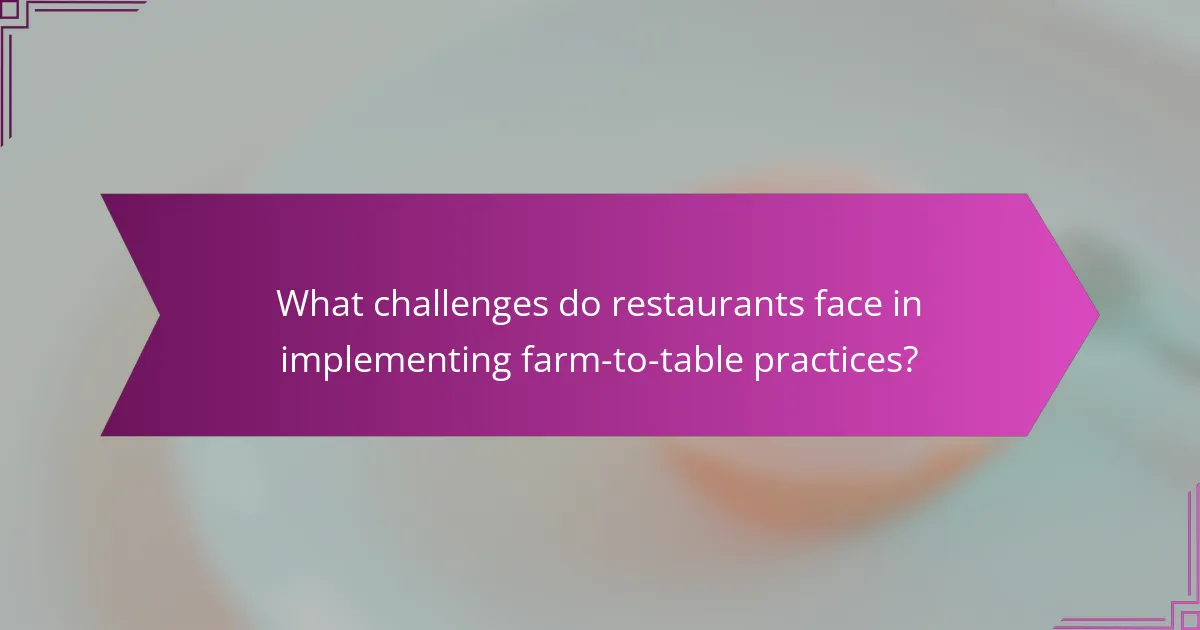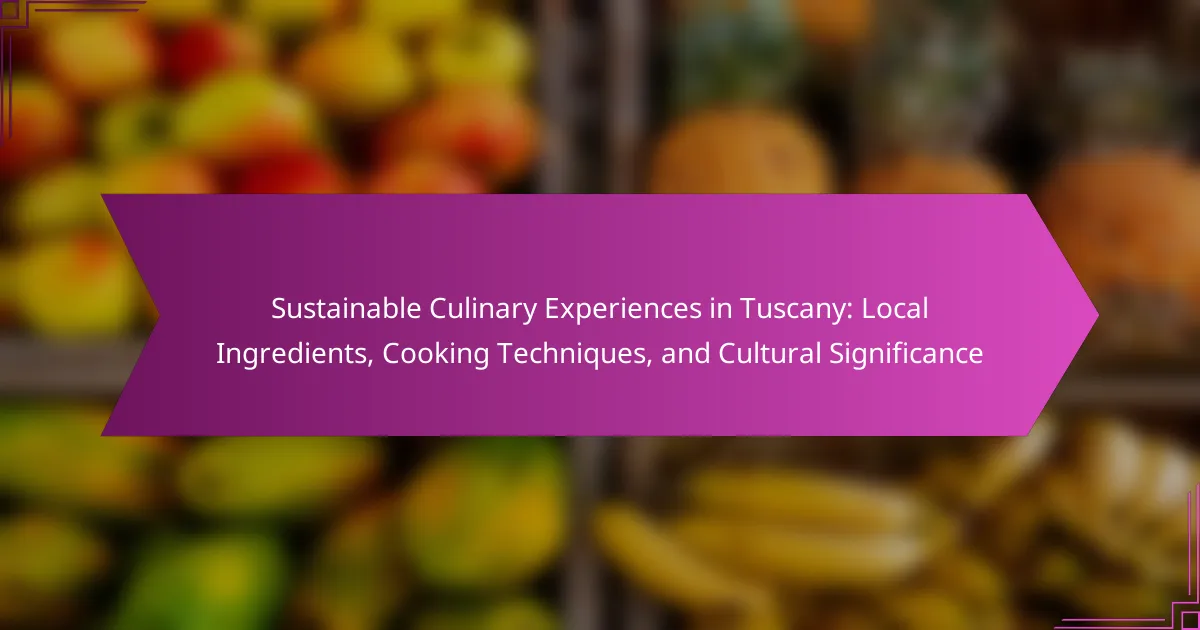Farm-to-table dining in Paris offers fresh ingredients and supports local farmers, enhancing flavor and sustainability. This article explores the benefits of seasonal menus, highlights popular restaurants like Le Mary Celeste and Chez Janou, and discusses the challenges of sourcing local produce. Discover how this dining trend connects you to the local culture while promoting healthier meal options.

What are the key benefits of farm-to-table dining in Paris?
Farm-to-table dining in Paris offers numerous benefits, including fresh ingredients, support for local farmers, and seasonal menus. These aspects enhance flavor and sustainability. Dining at such establishments promotes a connection to the local culture and environment. Additionally, it often leads to healthier meals, as dishes are prepared with organic produce free from preservatives.
How does farm-to-table dining impact local economies?
Farm-to-table dining positively impacts local economies by supporting local farmers and reducing food transportation costs. This dining model encourages consumers to buy fresh, seasonal produce directly from nearby sources, fostering community relationships. As a result, local businesses thrive, creating jobs and stimulating economic growth. For example, in Paris, popular restaurants like Le Comptoir de la Gastronomie emphasize local sourcing, showcasing seasonal menus that reflect regional flavors. This approach not only enhances culinary experiences but also strengthens the local agricultural economy.
Why is sustainability a core principle of farm-to-table dining?
Sustainability is essential in farm-to-table dining because it promotes environmental health and supports local economies. By sourcing ingredients directly from local farms, restaurants reduce carbon footprints and ensure fresher produce. This practice also fosters community connections and encourages biodiversity. Seasonal menus reflect the availability of local crops, enhancing flavor and nutritional value.
What health advantages are associated with farm-to-table meals?
Farm-to-table meals offer numerous health advantages, including fresher ingredients, better nutrient retention, and reduced exposure to preservatives. These meals often include seasonal produce, enhancing flavor and nutritional value. Additionally, they support local agriculture, promoting sustainable food systems. Eating locally sourced foods can also lead to improved mental well-being due to a stronger connection to the community and environment.

Which popular restaurants exemplify farm-to-table dining in Paris?
Le Mary Celeste, Les Fines Gueules, and Chez Janou exemplify farm-to-table dining in Paris. These restaurants prioritize local, seasonal ingredients, showcasing the vibrant flavors of the region. Le Mary Celeste offers a diverse menu with fresh produce and artisanal products. Les Fines Gueules focuses on traditional French cuisine with a modern twist, emphasizing sustainable sourcing. Chez Janou features Mediterranean-inspired dishes with ingredients sourced from nearby markets. Each restaurant reflects the commitment to quality and locality that defines the farm-to-table movement in Paris.
How do seasonal menus enhance the farm-to-table experience?
Seasonal menus significantly enhance the farm-to-table experience by showcasing fresh, locally sourced ingredients. They reflect the natural rhythms of agriculture, allowing diners to enjoy dishes that celebrate the best produce available at any given time. This approach not only promotes sustainability but also supports local farmers, fostering a stronger community connection. Seasonal menus encourage culinary creativity, as chefs adapt their offerings based on the harvest, leading to unique dining experiences that change throughout the year.
What unique dishes can be found at top farm-to-table establishments?
Top farm-to-table establishments in Paris offer unique dishes that highlight seasonal ingredients. Examples include beetroot tartare with local herbs, heirloom tomato salad drizzled with artisanal olive oil, and wild mushroom risotto featuring freshly foraged fungi. Each dish reflects a commitment to freshness and sustainability, showcasing the culinary creativity of local chefs.

How does the concept of farm-to-table dining vary across different cultures?
Farm-to-table dining in Paris emphasizes fresh, local ingredients sourced directly from regional farms. This approach fosters sustainability and supports local economies while enhancing the culinary experience.
The benefits of farm-to-table dining in Paris include improved flavor, seasonal variety, and reduced carbon footprints. Popular restaurants such as Le Comptoir de la Gastronomie and Chez Janou offer seasonal menus that reflect the local harvest. These establishments often change their offerings to highlight ingredients at peak freshness.
In Paris, farm-to-table practices encourage chefs to create innovative dishes that celebrate the city’s rich culinary heritage. This unique attribute of Parisian dining enhances the cultural experience for locals and tourists alike. Seasonal menus not only promote health but also connect diners with the rhythm of nature.
What influences do local agricultural practices have on menu offerings?
Local agricultural practices significantly shape menu offerings in farm-to-table dining. Seasonal produce influences the variety and freshness of dishes, leading to a dynamic menu that reflects local harvests. For example, Parisian restaurants often highlight ingredients from nearby farms, enhancing flavor profiles and supporting local economies. This practice fosters a unique dining experience that emphasizes sustainability and community connection.
Which seasonal ingredients are featured in Parisian farm-to-table cuisine?
Parisian farm-to-table cuisine features seasonal ingredients like asparagus in spring, tomatoes in summer, mushrooms in autumn, and root vegetables in winter. These ingredients enhance freshness and flavor while supporting local agriculture. Seasonal menus often highlight these components, creating a dynamic dining experience that reflects the changing landscape.

What challenges do restaurants face in implementing farm-to-table practices?
Restaurants face several challenges in implementing farm-to-table practices, including sourcing consistent local produce, managing supply chain logistics, and ensuring seasonal menu adaptability. These challenges can lead to increased costs and potential menu limitations. Additionally, educating consumers about the benefits of local sourcing is essential for market acceptance.
How do supply chain issues affect farm-to-table dining?
Supply chain issues can significantly disrupt farm-to-table dining by affecting ingredient availability and pricing. When local farmers face delays or shortages, restaurants struggle to source fresh, seasonal produce. This can lead to increased menu prices and reduced variety, impacting the overall dining experience. Additionally, inconsistent supply can hinder restaurants’ ability to maintain their commitment to sustainability and quality. As a result, diners may notice fewer farm-to-table options and a shift towards less local sourcing.
What are common misconceptions about farm-to-table dining?
Common misconceptions about farm-to-table dining include the belief that it is always more expensive, that it only features organic produce, and that it lacks variety. Many assume that all farm-to-table restaurants source exclusively from local farms, which is not always the case. Additionally, some people think seasonal menus are limited in options, but they often provide unique dishes that reflect the freshest ingredients available.

Which trends are shaping the future of farm-to-table dining in Paris?
Sustainability, local sourcing, and seasonal ingredients are key trends shaping the future of farm-to-table dining in Paris. Restaurants increasingly prioritize organic produce and partnerships with local farmers. This approach not only enhances food freshness but also supports the local economy. Furthermore, the rise of plant-based menus reflects changing consumer preferences towards healthier dining options.
How is technology influencing farm-to-table practices?
Technology enhances farm-to-table practices by improving supply chain transparency and efficiency. Digital platforms connect consumers directly with local farmers, allowing for real-time tracking of produce. This fosters sustainability and supports local economies. Additionally, apps facilitate seasonal menu planning, ensuring restaurants serve fresh, in-season ingredients.
What role do consumer preferences play in the evolution of farm-to-table dining?
Consumer preferences significantly shape farm-to-table dining by driving demand for fresh, local ingredients. As diners increasingly seek sustainability and quality, restaurants in Paris adapt their menus to reflect these values. Seasonal offerings highlight the importance of local produce, enhancing the dining experience. Popular restaurants often showcase unique attributes, such as partnerships with local farmers, which further attract health-conscious consumers. This evolving landscape emphasizes the connection between food, community, and environmental responsibility, aligning with modern consumer expectations.
What practical tips can enhance your farm-to-table dining experience?
To enhance your farm-to-table dining experience, focus on sourcing seasonal ingredients and supporting local producers. Prioritize restaurants that highlight these attributes, such as organic farms and sustainable practices. Engage with chefs about their sourcing methods to deepen your connection to the food. Consider participating in farm tours or local markets to understand the journey from farm to plate.



